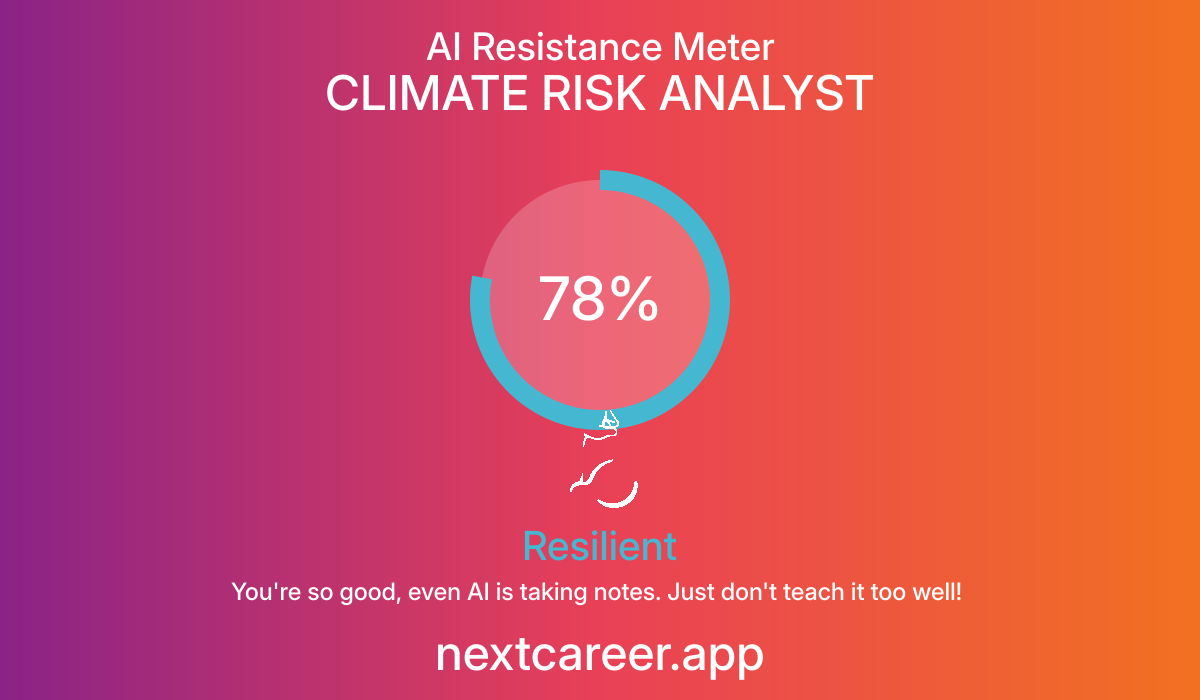AI Resistance Analysis
CLIMATE RISK ANALYST
CLIMATE RISK ANALYST
AI Resistance Score
AI Resistance Meter
Resilient
CLIMATE RISK ANALYST
You're so good, even AI is taking notes. Just don't teach it too well!
The role of a Climate Risk Analyst is increasingly vital given the rising importance of environmental risk assessment amidst climate change challenges. While AI can assist in analyzing large datasets and providing predictive analytics, the nuanced understanding of socio-economic factors, regulatory environments, and human-centric implications of climate risk requires a level of human insight and emotional intelligence that AI is not yet capable of replicating effectively. In the near term, AI can enhance the efficiency of data analysis and modeling; however, the need for human interpretation, ethical decision-making, and stakeholder communication secures a strong foundation for this profession.
The role of a Climate Risk Analyst is increasingly vital given the rising importance of environmental risk assessment amidst climate change challenges. While AI can assist in analyzing large datasets and providing predictive analytics, the nuanced understanding of socio-economic factors, regulatory environments, and human-centric implications of climate risk requires a level of human insight and emotional intelligence that AI is not yet capable of replicating effectively. In the near term, AI can enhance the efficiency of data analysis and modeling; however, the need for human interpretation, ethical decision-making, and stakeholder communication secures a strong foundation for this profession.
Key Factors
- Cognitive Tasks: AI can handle data-heavy tasks and statistical analyses effectively, streamlining the research process.
- Emotional Intelligence: The role requires stakeholder engagement and collaboration, where human intuition and relationship skills are paramount.
- Physical Skills: The role does not involve significant physical skills that could be automated; mainly desk-based.
- Creative Thinking: Analysts must devise innovative strategies to mitigate climate risk, an area where human creativity is essential.
Human Advantages
- Ability to interpret complex regulatory frameworks and societal norms related to climate policy.
- Strength in navigating stakeholder relationships and fostering collaboration across interdisciplinary teams.
- Expertise in adapting findings into actionable strategies that resonate with diverse audiences.
AI Vulnerabilities
- AI may struggle with interpreting unstructured qualitative data such as policy implications and community impacts effectively.
- The rapidly changing and complex nature of climate scenarios may exceed current AI models' predictive accuracy.
Recommended Actions
- Invest in upskilling to better understand AI tools and data analytics.
- Enhance soft skills, especially in communication and emotional intelligence, to maintain a collaborative edge.
- Engage in interdisciplinary projects that bridge technical climate models with social and economic implications.
- Advocate for policies that integrate human oversight in AI-assisted decision-making frameworks for climate risks.
In the near term (5 years), the role will likely evolve to integrate AI tools for enhanced data analysis and scenario modeling. Analysts will become adept at using AI as a complementary tool rather than a replacement. In the long term (20+ years), as AI continues to advance, Climate Risk Analysts may need to focus more on strategy development, ethical implications, and community engagement, ensuring that human insight integrates deeply into AI-generated recommendations.

Why Calculate AI Resistance?
Understanding how AI-resistant your career is becoming increasingly important in today's rapidly evolving job market. Our analysis combines multiple factors including required human skills, technological adaptability, and future industry projections to give you a comprehensive view of your career's sustainability.